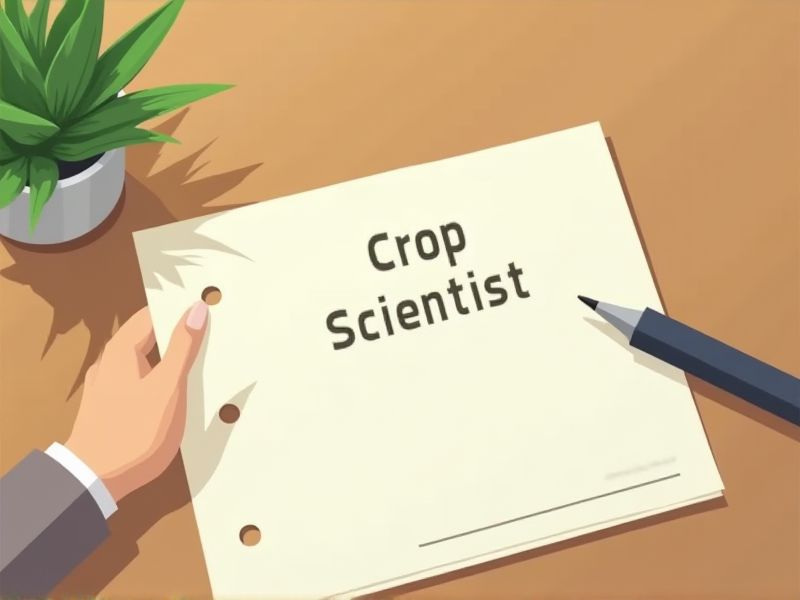
Crop scientists are tasked with developing sustainable agricultural solutions that require specialized expertise and knowledge. Certifications validate their skills, ensuring they can effectively tackle complex agricultural challenges and employ advanced technologies. These credentials also enhance credibility, opening doors for more impactful research and collaboration opportunities. Key certifications for crop scientists are indispensable for professional growth and efficacy in the field.
Certified Crop Advisor (CCA)
Certified Crop Advisors (CCAs) provide valuable expertise, leading to more effective and sustainable agricultural practices. Their knowledge helps crop scientists optimize resource use, enhancing yield and soil health. CCAs bridge the gap between research and practical application, ensuring that scientific advancements are effectively implemented in the field. Crop scientists benefit from CCAs' insights, which guide informed decisions on pest management, fertilization, and crop rotation strategies.
Certified Professional Agronomist (CPAg)
A Certified Professional Agronomist (CPAg) brings advanced expertise in soil management and crop production, crucial for optimizing yield and sustainability. CPAgs provide scientifically validated advice, reducing the risk of crop failure and financial loss for farmers. They apply knowledge of pest control and nutrient management, ensuring crops are both healthy and environmentally sustainable. Their certification guarantees continual education, keeping agronomists updated on the latest agricultural technologies and practices.
Certificate in Crop Science (e.g., from Cornell University)
A Certificate in Crop Science from an institution like Cornell University provides foundational knowledge essential for understanding crop growth and management. This formal education equips potential crop scientists with the technical skills to conduct research and develop sustainable agricultural practices. Employers often seek candidates with recognized certifications to ensure they possess the necessary expertise in the field. Certification also aids in staying updated on the latest advancements and technologies in crop science, fostering ongoing professional development.
Soil Health Certification
Soil Health Certification equips crop scientists with a standardized framework to assess and improve soil quality, directly impacting crop yields. Enhanced soil health knowledge enables scientists to implement practices that boost sustainable agriculture and reduce environmental impact. Certified knowledge in soil health fosters informed decision-making, leading to more resilient cropping systems. Access to cutting-edge soil health methodologies strengthens collaboration among scientists, enhancing collective agricultural innovation.
Precision Agriculture Certification
Precision Agriculture Certification enhances a crop scientist's ability to utilize advanced technology and data analytics for improved crop management. The certification ensures they understand the integration of GPS, drone technology, and IoT for site-specific crop decisions, which increases yield and resource efficiency. It equips them with skills to reduce environmental impact by optimizing inputs like water and fertilizers, aligning with sustainable farming practices. Certification validates their expertise, making them more competitive and credible in the agricultural industry.
Sustainable Agriculture Certification
Sustainable agriculture certification guides crop scientists in implementing practices that maintain soil health and reduce environmental impact. Certification ensures adherence to international standards, promoting trust among consumers who are increasingly concerned about sustainability. With the global push towards reducing carbon footprints, certified practices can assist scientists in enhancing crop resilience to climate change. Certified crop scientists are better positioned to access funding opportunities that prioritize sustainable initiatives.
Integrated Pest Management (IPM) Certification
Integrated Pest Management (IPM) Certification for crop scientists provides them with the necessary knowledge to implement sustainable pest control strategies, reducing reliance on chemical pesticides. Certification ensures crop scientists are equipped to maintain ecological balance, improving environmental and human health outcomes. It enhances credibility, enabling them to advise and guide agricultural practices with a focus on long-term productivity. Adopting IPM practices contributes to economic efficiency by minimizing costs associated with pest damage and pesticide usage.
Plant Breeding and Genetics Certification
The certification in Plant Breeding and Genetics equips crop scientists with specialized knowledge crucial for improving crop yields and resilience. With climate change impacting agricultural stability, certified experts can develop varieties that withstand environmental stressors. The program also ensures proficiency in modern biotechnological tools, which are increasingly central to genetic enhancement. Certification signals to employers and collaborators that the individual has met industry-recognized standards, fostering trust and opportunities for research partnerships.
Organic Agriculture Certification
Organic agriculture certification ensures crop scientists adhere to environmentally friendly practices, reducing synthetic chemical use and promoting biodiversity. It establishes a trusted standard that enables scientists to market products as organic, thus gaining consumer confidence and increasing market value. Certification facilitates access to government grants and incentives designed to support sustainable agricultural research. It also provides a structured framework for researchers to contribute to sustainable farming practices, aligning scientific innovation with ecological health.
Irrigation and Water Management Certification
Crop scientists need expertise in irrigation and water management because 70% of global freshwater is used in agriculture, necessitating efficient usage. Certification provides them with updated techniques to combat water scarcity, which affects crop yield and quality. It ensures they understand soil-water-plant relationships to optimize growth conditions. By mastering these skills, scientists can effectively address challenges like droughts and fluctuating precipitation, safeguarding food security.
Summary
As a reader, when examining the impact of certifications acquired by Crop Scientists, you can expect enhanced credibility in their field of expertise. Certifications often lead to the adoption of advanced farming techniques, resulting in increased crop yields and sustainable practices. This, in turn, fosters innovation and data-driven solutions in agriculture. Furthermore, certified Crop Scientists can drive informed decisions that benefit local and global agricultural communities.
